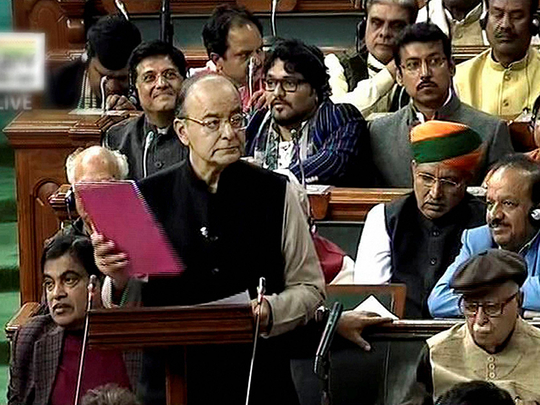
Dubai: India’s Finance Minister Arun Jaitley on Wednesday presented the federal budget 2017-18, the fourth budget by the Narendra Modi government with huge spending plan targeted at boosting the rural economy to compensate for the recent slowdown in growth following demonetisation of Rs500 and Rs1000 notes.
The budget comes days ahead of key regional elections has allocated funds to bring more irrigation, roads, electricity and rural employment with the promise of farmers and rural entrepreneurs getting more access to credit.
India announced record spending of Rs3.96 trillion (Dh214 billion, $59 billion) to build and modernise its railways, airports and roads as Prime Minister Narendra Modi aims to upgrade the strained infrastructure of the country.
The government will build airports in smaller cities in partnership with private companies, finance minister Jaitley said while presenting the government’s budget proposals for the fiscal year starting in April. As part of higher infrastructure spending, suburban railways will come up across the country and Indian Railways will form ventures with logistics companies to provide greater connectivity to ports, he said.
India will announce a metro rail policy, which will ensure implementation and funding, and open up job opportunities, Jaitley said. A new Metro Rail Act will facilitate greater private participation and investment in construction and operation, he said.
Jaitley said the focus of the 2017-18 will be on 10 important sectors, including farmers, infrastructure, digital economy and tax administration to transform, energise and clean India.
The other areas of focus include rural India, the youth, poor and under-privileged, the financial sector, public service and prudent fiscal management.
“The government will continue with the reforms to boost economic activity,” he said in his speech in the Lok Sabha, while setting three main agenda of the Budget — Transform, Energise, Clean India (TECIndia).
The budget included a substantial increase in farm credit and highest ever allocation for Mahatma Gandhi National Rural Employment Guarantee Act (MNREGA) at Rs480 billion.
Apart from tax reforms, budget is focused heavily on rural spending, among the steps to help the economy recover from the government’s decision to ban 86 per cent of the currency in circulation.
Economists and analysts have warned that the note ban would result in a slowdown in economic growth with the adverse impact lingering for several months.
Bank of America Merrill Lynch’s economist Indranil Sen Gupta said in a recent note that he believes the shock (of note ban) could spill into February and maybe March, at a cost of 0.3-0.5 per cent of GDP per month. He downgraded full year GDP growth by 80 basis points to 6.9 per cent and expects rate cuts from February. Government expects to counter the slowdown with greater spending in rural sectors where propensity to consume is higher.
“There was a lot of anticipation and apprehension about Budget 2017. There was enough to satisfy those anticipating, and relief for those who were apprehensive. The big push to expenditure for farmers, rural sector, affordable housing and infrastructure will give a fillip to growth and employment. Putting more money in the hands of the common man through tax rate reduction, encouraging FDI, measures for education, skilling and employment of youth are all positive measures for economic growth over the next few years,” said Shanti Ekambaram, President — Consumer Banking, Kotak Mahindra Bank.
Analysts said the budget is fiscally prudent, although fiscal deficit was pegged higher at 3.2 per cent keeping in mind the need to increase public investments in the absence of private sector investments to ensure GDP growth.
“The finance minister has delivered a positive and fiscally- responsible budget that is farmer- friendly, with liberal funds’ allocations for agriculture, low income and rural segments of the population; arguably with an eye on the elections in 5 key states around the corner,” said Suresh Kumar, Founder- Chairman, Tricolour Values Group.












